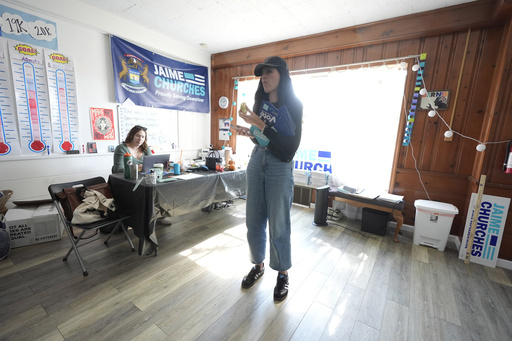
TRENTON, Mich. — Voters in Michigan are currently faced with a significant decision that could shape not only the state’s political landscape but also influence the upcoming presidential race involving Democratic candidate Kamala Harris. This pivotal election will determine whether the Democrats can retain control over state governance, a position they achieved through a remarkable victory in 2022, which marked the first time in nearly four decades that they held both legislative chambers alongside the governor’s office.
In the wake of the 2022 midterms, the Michigan Democrats pushed forward a robust progressive agenda, capitalizing on their newfound legislative dominance. Although the state Senate is not up for election this cycle, there’s an urgent concern over the potential loss of their slim majority in the state House. Such a setback could severely hinder Governor Gretchen Whitmer’s ability to implement additional reforms during her final two-year term.
“We’ve accomplished notable feats but always with the narrowest of margins,” Whitmer stated during a recent press conference, underlining the precarious position her administration is in.
Michigan is one of several states where the composition of the legislature could shift, alongside others like Arizona, Minnesota, New Hampshire, Pennsylvania, and Wisconsin. Whitmer has spent the majority of her governorship navigating a Republican-dominated legislature, emphasizing that last two years of Democratic control were crucial for advancing essential laws concerning gun control and taxes.
The Democrats are primarily campaigning on the protection of reproductive rights, arguing that the continuation of their leadership is vital despite the fact that abortion access is constitutionally protected in the state. On the other hand, Republican candidates contend that while Democrats maintain control both locally and federally, they have noticeably impacted residents’ financial security and overall safety.
“We need to rein in government and restore balance,” asserted Bill G. Schuette, head of the Michigan House Republican Campaign Committee, reflecting the party’s stance.
In the Downriver region, near Detroit, Jaime Churches, a former elementary school teacher, is campaigning for a second term in the state House. After winning her previous election by a mere 660 votes, she emphasizes reproductive rights and infrastructure improvements as critical issues.
“For me, I fully understand the challenges of getting elected in such a competitive environment,” Churches remarked at her campaign headquarters in Trenton.
Churches, who is 36 years old, is competing against 22-year-old Republican Rylee Linting in a predominantly middle-class district characterized by a strong union presence. While both candidates draw from the momentum of their respective party leaders, they are also focusing on local issues to set themselves apart.
Linting, serving as a state GOP youth vice chair and previously associated with Charlie Kirk’s Turning Point USA, is advocating for smaller government and conservative values in education. She presents her age as an advantage, promising a new perspective on political matters that resonates with local constituents.
“It’s my generation that will ultimately endure the fallout from inadequate policies in Lansing,” Linting expressed in an interview.
In the last midterm elections, a grassroots initiative aimed at securing abortion rights propelled Democratic success. Frank Hamet, a Republican precinct delegate from Flat Rock, noted that turnout during the presidential election is expected to similarly influence tight races in the Downriver area.
Hamet also pointed out a shift among some blue-collar workers, who are increasingly attracted to Trump’s messaging, indicating potential challenges for Democratic candidates in legislative races.
“If people are unhappy with the current state of affairs, it heightens the risk of a total political overhaul at the ballots,” he said.
In preparation for the upcoming contests, the national Legislative Campaign Committee announced a significant contribution of $500,000 to target 13 specific races in Michigan. Recent financial disclosures indicated the committee has already invested over $3.5 million in the state.
Meanwhile, the Republican State Leadership Committee’s activity in Michigan remains unclear; however, state PACs have reported an expenditure of $1.6 million this election year.
Both political factions had earmarked substantial sums for state legislative contests, with 5,800 seats in 44 states open to election this year.
Democrats in Wisconsin are hopeful about retaking Assembly control for the first time since 2011 and aspire to gain traction in the Senate to dominate that chamber in the coming years. In Minnesota, Governor Tim Walz, who was Harris’s running mate as vice president, has leveraged a Democratic majority to push through aggressive progressive policies, which could hang in the balance should a special election alter the Senate’s makeup.
New Hampshire’s political scene has shown volatility, with its enormous House flipping control in six of the last ten elections. The current breakdown leaves the House with 197 Republicans, 191 Democrats, one independent, and 11 vacant seats, indicating a mix of ideologies and limited legislative action.
Should the Republicans reclaim the Michigan House, there’s a likelihood that Democrats would swiftly move to pass critical voting rights legislation and other measures during the lame-duck period spanning Election Day and the commencement of the new Legislature.
Whitmer emphasized the significance of down-ballot races, despite the spotlight often resting on presidential elections, highlighting that state legislature seats profoundly influence everyday life. “The individuals elected to the Legislature wield immense power over your day-to-day existence,” Whitmer asserted.
